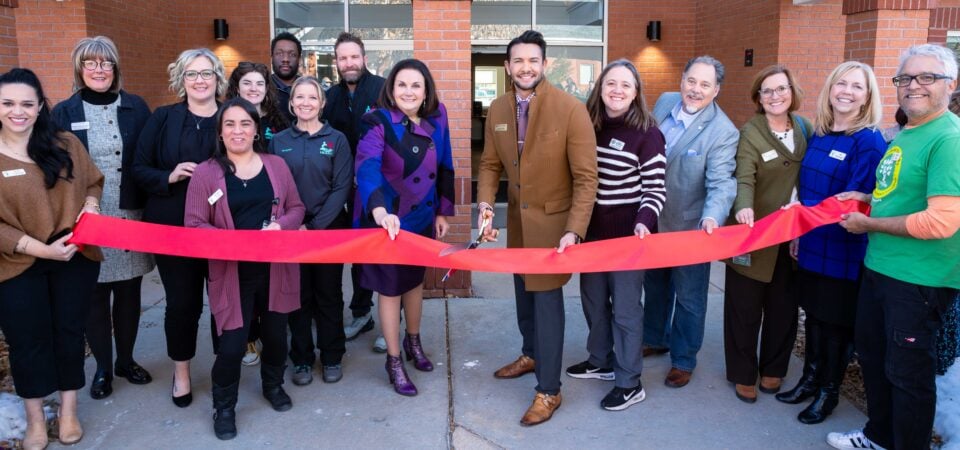By order of Sheriff Darren Weekly, Stage 1 Fire Restrictions are in place for unincorporated areas of Douglas County. Ordinance No. O-012-004 restricts open fires, open burning and the use of fireworks in the unincorporated areas of Douglas County.
By order of Sheriff Darren Weekly, Stage 1 Fire Restrictions are in place for unincorporated areas of Douglas County. Ordinance No. O-012-004 restricts open fires, open burning and the use of fireworks in the unincorporated areas of Douglas County.
Douglas County understands that homelessness is a regional challenge that requires a united, strategic response. Through strong partnerships and shared goals, we are working alongside municipalities, service providers and national organizations to ensure lasting solutions. The key pillars of our regional approach are the GOALS Program, the Aurora Regional Navigation Campus, our participation in Built for Zero and partnering with the Metro Denver Homeless Initiative.
Douglas County is proud to partner with Arapahoe County and Family Tree to bring the GOALS program to Douglas County thanks to a $1 million federal grant. This Two-Generation (2Gen) housing solution designed specifically for families experiencing homelessness provides temporary housing and comprehensive wraparound services for up to five Douglas County families at a time.

GOALS Ribbon cutting event in Aurora
GOALS offers families a safe, private living space for four to nine months, plus an additional year of follow-up support. The program uses a 2Gen, whole-family approach, meaning services are designed to address the needs of both parents and children simultaneously. This model helps break the cycle of homelessness and poverty by:
Stabilizing families with secure, temporary housing
Improving employment and income stability for parents
Enhancing mental health and overall well-being
Increasing children’s academic success
Strengthening family connections and community ties
GOALS is the first-ever countywide resource in Douglas County dedicated specifically to families with children experiencing homelessness. It’s built on the principle that housing, combined with services, creates lasting change. This expansion represents not only a new chapter in regional collaboration, but a powerful investment in our community’s future. The GOALS program is a shining example of how regional partnerships and federal funding can come together to create sustainable solutions for families in need right here in Douglas County.

Future site of Aurora Navigation Campus
Douglas County is proud to partner with the City of Aurora to support the Aurora Regional Navigation Campus, a comprehensive facility designed to assist individuals experiencing homelessness across the metro area. Through this partnership, funded by $1,125,000 in American Rescue Plan Act dollars, Douglas County residents referred by HEART will have access to five dedicated beds and the full range of wraparound services the campus provides.
Opening on Nov. 17, 2025, the Aurora Regional Navigation Campus will offer on-site shelter, meals, medical care, mental health and addiction support, job training and more, all in a pet-friendly, service-rich environment. This collaboration reflects Douglas County’s commitment to regional solutions and ensures that residents in need have access to effective, compassionate care through coordinated partnerships across county lines.
 Douglas County Housing Partnership
Douglas County Housing PartnershipThe Douglas County Housing Partnership (DCHP) has been a key partner in addressing local housing challenges. As a multi-jurisdictional housing authority, DCHP collaborates with Douglas County and municipalities like Castle Pines, Castle Rock, Lone Tree and Parker. It delivers vital services from rental voucher administration and first-time homebuyer assistance to foreclosure counseling and equitable down-payment programs, helping bridge the gap for working families struggling with affordability.
The Douglas County Homeless Initiative works alongside DCHP to integrate homelessness prevention into its broader housing strategy. By coordinating with DCHP’s Housing Choice Voucher and rental assistance programs, the Homeless Initiative ensures that individuals and families at risk of or experiencing homelessness can access affordable housing solutions more quickly. This collaboration supports a full spectrum housing response, from emergency outreach and stabilization through HEART to long-term security via DCHP’s homeownership and voucher opportunities. Visit Douglas County’s affordable housing webpage for more information.
 Built for Zero
Built for ZeroDouglas County is part of Built for Zero, a nationwide initiative led by the nonprofit Community Solutions that brings together more than 100 communities working to measurably and sustainably end homelessness. The movement helps communities use real-time, person-specific data and coordinated local systems to reduce and ultimately end homelessness, population by population.
In the Built for Zero model, Functional Zero means that a community has built a sustainable system where homelessness is rare, brief and non-recurring for a specific population, such as Veterans. It signifies that the number of people experiencing homelessness is less than the community’s proven capacity to house them quickly.
Since joining Built for Zero in April 2021, Douglas County has demonstrated that homelessness is solvable through collaboration, quality data and a commitment to improvement. Together with the Metro Denver Homeless Initiative, Douglas County has reached Functional Zero for Veteran homelessness, a major milestone that highlights the power of coordinated outreach and strategic data use.
From January 2023 to September 2024:
64% of Veterans experiencing homelessness in Douglas County were housed within 98 days of being identified.
Local and regional teams reduced the inflow of new cases and improved housing placement speeds.
A system-wide commitment to continual improvement made Douglas County a model for other communities across the country.
Douglas County is a regional partner of the MDHI, the federally designated Continuum of Care (CoC) for the area. MDHI leads a collaborative effort to end homelessness across the seven-county Denver metro region by connecting communities, coordinating services and ensuring accountability. Learn more at mdhi.org.